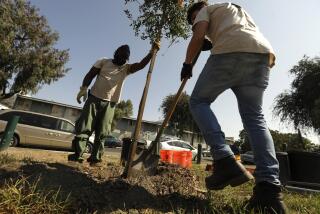The roots of the Urban Farm saga
- Share via
Re “Lights, Camera, Eviction,” editorial, June 14
It is true that some in Hollywood loaned their star power to the effort to save the South Central farm. But that is not the story. The story is one built on the idea of providing food at a neighborhood level, about community support in an inhospitable place. This was not a story cooked up by Hollywood; it was built by good people, and Hollywood was attracted to it.
For The Times to just throw up its hands and say developer Ralph Horowitz “is entirely within his rights” is cold and cynical. The Times has missed an opportunity to stand with the many who challenge the idea that even in our capitalist society, where private property rights are often trumpeted above all else, there are times to stand for the greater good.
MORRIGAN PHILLIPS
Washington
*
As wonderful as the garden is as a community asset, it represents only a part of what the Los Angeles Regional Foodbank does. The Urban Garden serves roughly 300 farmers, many of whom subsist on the food they grow. But the Foodbank serves roughly 300,000 people a week.
I know from working at the Foodbank and from serving two terms on its board that one of its biggest challenges is getting support from our immensely powerful and influential entertainment community. It seems, however, that evicting 300 politically vulnerable farmers is sexy in a way that feeding 300,000 working poor is not.
My support remains with the Urban Garden farmers and the courageous people sticking up for them. But perhaps it’s time for our celebrity community to also give its support to the massive, ongoing work that the Foodbank does every day.
DOUG LEVINSON
Los Angeles


